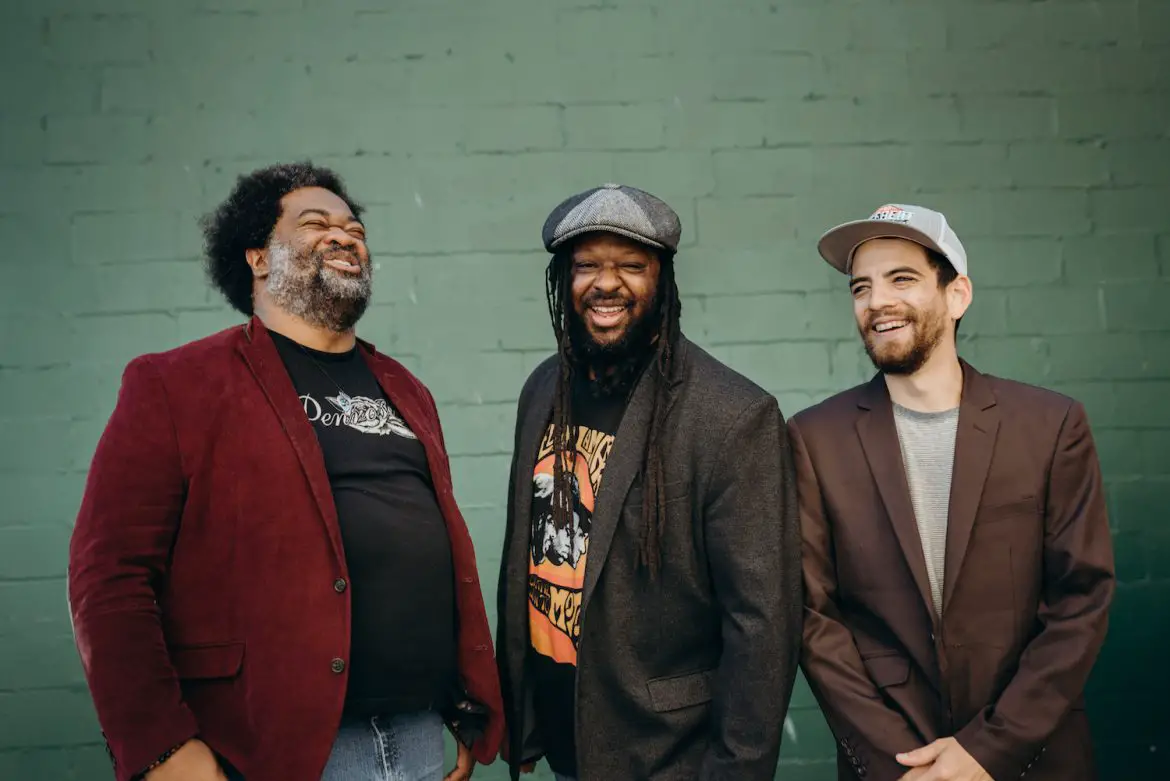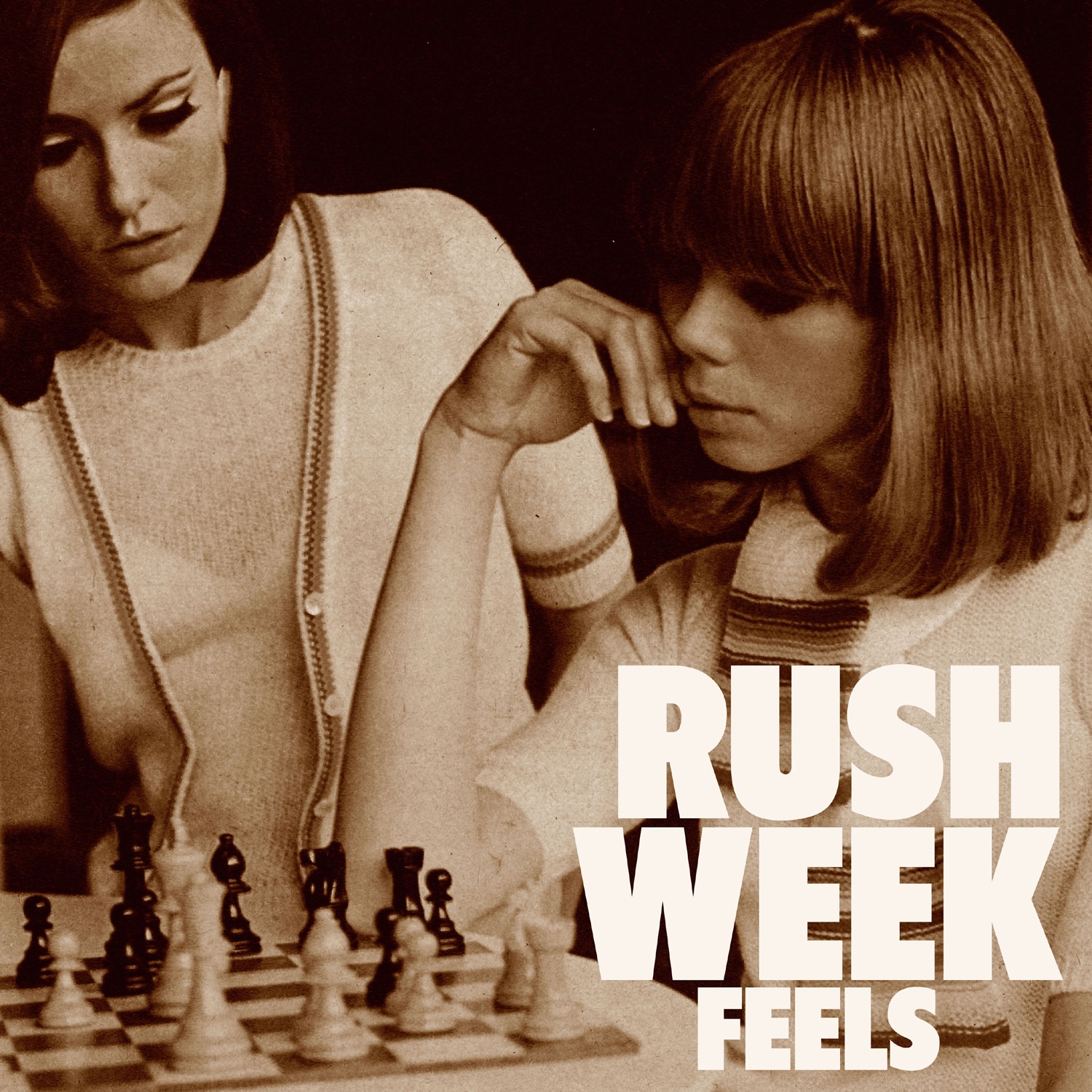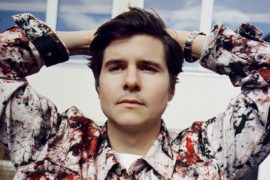Forget the title, because one thing is absolutely, positively certain when watching the Delvon Lamarr Organ Trio: These cats absolutely have all the chops.
Stream: “Call Your Mom” – Delvon Lamarr Organ Trio
We just like to play music, period. When we go in the studio and, well, you know how that goes. A couple days and it’s like two albums.
Forget the title, because one thing is absolutely, positively certain when watching the Delvon Lamarr Organ Trio only 10 minutes into their set: these cats absolutely have all the chops.
Jimmy James and the man himself might say skill doesn’t sell records, but their records sell chops. Any album out there with Colemine Records imprint wouldn’t have a chance otherwise. The difference is in how these chops are employed.

Surfing With The Alien provides the perfect contrast to any of the Organ Trio’s effort. It’s a guitar playing marvel, but looking to any Steve Vai record for an emotional connection provides for a hollow experience. His fingers might move faster than subatomic particles in the Large Hadron Collider but between all the science, where’s the romance? Where’s the human element?
Listening to I Told You So, the Organ Trio work to stitch together Delvon Lamarr’s ability to carry a swinging bass line on his left hand while cuing up a solo from Jimmy James on his lyrical right. Grant Schoff, the second drummer for the trio, uses a hip-hop backbeat to give the souljazz some oomph. Altogether, it proves to be one of the best jazz records this year. And I’m not saying that because it conceals a “Careless Whisper” cover that rivals George Michael’s forever classic.
I Told You So is a sealed stamp of approval upon a wave of success triggered by the Tacoma three-piece’s blistering set of appearances on KEXP.
The independent music station of the Pacific Northwest introduced a whole world of listeners to a band that had the chops and knew when to use them. Every record since just tries to prove that point.
Livewire and freewheeling, a show with the Delvon Lamarr Organ Trio is not to be missed. Between Lamarr and James alone, any ho-hum four minute ditty could transform into a half hour odyssey and render the Trio to soul and jazz music what the Grateful Dead were to the blues and rock.
Since the sophomore studio release in early 2020, drummer Dan Weiss has taken over from Schoff and begun recording with James and Lamarr. The trio have an enviable backlog, able to spitball whole albums in only a couple days and teasing their audience with a repe.rtoire that is wider than most people realize. To the trio, it’s all music and they just choose to translate it into a lexicon informed by Booker T, Charles Earland and BB King. To honor their newest (hopefully most permanent) drumming member, the new LP is Cold As Weiss and will be released in February 2022.

Returning to I Told You So, the fusion of Black musicality has long been reported since the early Nineties, but the trio manage this feat with their thoroughbred sound. “Aces” sees James rip out into a rock ‘n’ roll riffwork tear; “Call Your Mom” steps with a rock solid R&B-by-hip-hop percussive swagger; “Fo Sho” takes ears to church on Lamarr’s play of the Hammond B3; “From The Streets” boom-baps to a sleuthing, observational guitar.
And where would this album be without that rock solid rendition of “Careless Whisper?” Combined with the originals, the trio use the power of the classic to juice this record over the top and made chatting with the Trio beyond a necessity. They were a must-have conservation, and the conversation did not disappoint.
Like their live performances, Weiss, James and Lamarr trade off sentences. They side-eye smirks and crack in-jokes with abandon. References to the Predator, Vanilla Ice and the Little Train That Could spot the interview. Reading along to their rapport, you might not be able to hide a laugh or break out into nothing but smiles because here is a band that is a truism to bands everywhere.
The Delvon Lamarr Organ Trio love what they do as they do what they love together.
Stream: ‘I Told You So’ – Delvon Lamarr Organ Trio
A CONVERSATION WITH DELVON LAMARR ORGAN TRIO

Atwood Magazine: My first question is really simple: what have you guys been listening to?
Delvon Lamarr: I went back to my old school jazz roots, so I’ve been listening to a lot of cats like Jackie McLean and Kenny Dorham, things like that. My first love has always been jazz and so I’ve been looking around, trying to find some new cats from back in the day that nobody’s ever heard of. That’s my quest.
Dan Weiss: I’ve been listening to a lot of dub lately with the with the passing of Lee Scratch Perry. I got a bunch of his vinyl at home. There’s a newer artist named Pachyman, he just released a new record and he’s very old school dub, reggae vibe.
Delvon Lamarr: And here goes the interview.
Jimmy James: I’ll try not to have you translate the word shut up, but okay.
No don't worry I'll translate.
Jimmy James: Alright: shut up, shut up, shut up. Most of the stuff I’ve been listening to is BB King, Live in Cook County Jail, Chuck Berry, stuff like that. But mostly Motown and my Stax roots you know, listening to that and some Sixties Houston and Aretha. Maybe some Khruangbin but mostly that Stax and Motown. This could have been a longer list but—
Delvon Lamarr: That was only an hour and a half.
Jimmy James: (laughs) Alright, alright. We got the Predator on.
What was planning for this tour? What point did you guys decide that it must happen?
Delvon Lamarr: We were broke!
Jimmy James: (laughs)
More common answer than most people would believe.
Delvon Lamarr: We’ve been on hold for pretty much like a year and a half and the world needs music, it needs good music. So we want to get back out there, get back to spreading that love. That’s what we do and we love to do it.
Was there a temptation to release another album to support or did you guys decide I Told You So deserved its own tour?
Jimmy James: We just like to play music period. When we go in the studio and, well, you know how that goes. A couple days and it’s like two albums.
Delvon Lamarr: We actually have maybe seven years worth of music to release right now.
I find that in the artistic communities it's a better problem to have too much than not enough.
Jimmy James: Do we still have that country-western song we did?
Delvon Lamarr: Yeah, yeah.
Jimmy James: We should do a country western album.

I feel like if you guys did a country western album it would just be just as good.
Delvon Lamarr: We recorded it. We kind of made it up in the studio and recorded it. It actually ended up really good.
Jimmy James: We did “Jolene,” too.
Speaking of covers, the moment a lot of people got to know the Delvon Lamarr Organ Trio was when you covered Curtis Mayfield's “Move On Up.” Do you feel being associated with great covers as more of a blessing or a curse?
Delvon Lamarr: For me it’s a blessing. We play the kind of music we want to hear and we grew up listening to that stuff so it’s an honor and a treat to be able to do that successfully.
Dan Weiss: I didn’t record on any of the recordings but I’ve been playing shows with them for a year and a half and at the end of shows, people come up and are like “Dude, I love your version of Careless Whisper way more than the original version.” And it’s cool to hear that; there’s no vocals, the melody is played on the organ so it’s cool when you get into a moment and you hear the audience singing back while we’re playing.
I would have never expected you guys to play “Careless Whisper.”“]
Jimmy James: There was in England, too. That was wild.
Delvon Lamarr: We played that in London, man. I didn’t even get to play the melody.
Jimmy James: He set it up. We played the first melody and then all of a sudden—
Delvon Lamarr: They sing the whole song. That’s pretty cool.
Dan Weiss: I hear that yelled out more than any other song.
How do you guys go about choosing a song to cover? Is there a soulfulness or jazziness prerequisite?
Delvon Lamarr: Whatever Jimmy James throws out there, really.
Jimmy James: It has a lot to do with just taking it like “man, we really dig this song” and then flipping it our own way. We did a Luther Vandross tune… Delvon said we should do “Never Too Much” and everybody knew it and so we’re like “alright, let’s do it.”
Dan Weiss: Yeah, we’re playing like an Earth Wind and Fire song and now it’s in the repertoire and it just happens sometimes. We don’t mean to, but it just happens.
That's the big draw. You put on a complete live-wire show and you never know where it’s going to go. I had this next question for Grant Schoff but he's not here so, Dan, what do you think you bring as a drummer to the live experience?
Dan Weiss: I’m a good listener. [Delvon and Jimmy] go off on so many different things, sometimes we play a song for 18 minutes and they’re just going back and forth and I’m in the middle looking at the both of them like what the hell is happening. I know a lot of the songs that Jimmy James will go into so when he does go into these songs I can bust into the beat that goes with that song.
Jimmy James: Every now and again, though, a certain tune, we’ll watch Dan and he’ll be like “what are they doing?”
Dan Weiss: They really like to mess with each other, mess with time. I just have to sit there—
Jimmy James: “I think I can, I think I can, I think I can.”
Dan Weiss: “1-2-3-4, 1-2-3-4.” Just try and hold it down. That’s probably the question I get asked the most from people after shows: How do you follow along with what they’re doing? I don’t.
Jimmy James: You’re on your own, kid. Delvon’s got this look like “I’ll meet you on the other side.” You’re on your own. Figure out how to get to our destination.
Dan Weiss: But it’s fun. Grant is a great drummer, and I’ve had a really good time learning his part because I like what he does.

What albums have you performed on?
Dan Weiss: Just the stuff that we recorded during the pandemic. I think the first album that I’m on is going to be released at the beginning of next year.
Jimmy James: And you have that single, “Cold As Weiss.”
Dan Weiss: Yeah, the single was my first release with the band. It’s starting to trickle out here.
I'm looking forward to it; Jimmy, “Aces” sees you break out in this rootsy rock guitar jam. What was the process of developing that solo?
Jimmy James: I never really think about it. I just go with the feeling. Grant came up with that one and then Delvon had his thing to it and I seriously never think about solos. It’s just however I’m feeling that day. It’s like the weather, you don’t know if it’s gonna rain or if it’s gonna be sunshine or a tornado or something.
Watching you perform live, you're not even looking at your guitars. You're all up in your head.
Jimmy James: Yeah. Or, you know, he’s messing with me over here, Delvon, which he always does
Dan Weiss: I’ve seen him get into some deep zones before.
Jimmy James: It goes back to blues. That’s where I’m from. That’s what I know. Sometimes the notes are not even on the guitar that I want to play.
Delvon Lamarr: “Call Your Mom?”
Jimmy James: Yeah. Every time I listened to “Call Your Mom” there’s a part in the solo where that wasn’t what I was trying to do. But oh well, you just go with the feeling and you live it. And that’s it, you know.
When it comes to Tacoma, Washington, it's a city not very well known for its music scene nationally. People gravitate to either Seattle or Portland. How do you think your geography informs your music? Or does geography have nothing at all to do with your guys' music, with your brand of soul?
Delvon Lamarr: It’s more based off of influences. The Pacific Northwest has a super rich history of amazing artists that come out of there. But for me it’s all the stuff I’ve been listening to my entire life, whether from the Pacific Northwest or Europe.
What comparisons do you feel you get all the time?
Delvon Lamarr: One of the most common ones I get is Booker T. I get some Groove Holmes. When I’m playing straight ahead jazz I get a lot of people say I have a Charles Earland influence–just because the approach is different when you’re swinging–and Dr. Lonnie Smith.
Does it irk you or make you want to play differently?
Delvon Lamarr: Oh, no. I embrace it wholeheartedly. Those are the cats. And if I can be anywhere remotely to that level, then I will gladly take it and appreciate it and cherish it.
Jimmy James: I’m gonna flatter [Delvon] for a second. From my end, what makes him different is that he’s very lyrical. It sounds like a singer except that you’re hearing it through an organ. And then with bass sometimes you hear on organ “thump-thump-thump-thump-thump.” I bring up this so [Delvon’s] just gonna have to deal with it.
Delvon Lamarr: Go ahead. I told you, it’s copy-and-paste right here [holds up left hand].
Jimmy James: Copy-and-paste, that’s what it is. [But] when he plays bass… the bass moves, its swings, which is different because some people, they play really straight. There’s been many times before where we’ve played and people are like: “man, where’s the bassist coming from?” and later found out it’s [Delvon]. But to be able to sub divide a swing bass line but also have a lyrical melody? That’s pretty hard to do.
Delvon Lamarr: There’s so many comments about that too, especially on our YouTube video comments. Some people thought it was like overdub, like we’re playing to a bass track (laughs). Nope, that’s me.
It makes a lot more sense now why Dan asks what the hell is going on all the time.
Dan Weiss: Delvon was a drummer before he was an organist. He’s a drummer at heart. [He] plays in a custom rhythmic way that helps me because he… set[s] the meter for what to play along to. He knows what he wants to hear from a drummer so he’s still listening to the drum part while he’s playing so I’m like “oh shit–“
Delvon Lamarr: (laughs)
Dan Weiss: If I don’t hit a kick part he’ll give me the pattern of that to keep going. He knows what’s going on.
Jimmy James: When you come from a rhythmic thing… it’s a swing you don’t hear very often. Swing kind of stopped somewhere in the mid-Seventies. Everything has been streamlined straight and you know the meters. If you listen to Motown [or] any of those groups, they were listening to Big Band Jazz groups and that’s where they came from. Everything was a swing. When you swing it just grooves a lot harder.
Delvon Lamarr: The other thing to that is pocket. What I like about this cat over here [motions to Jimmy] is you said this: “chops don’t sell records.”
Jimmy James: (laughs)
Delvon Lamarr: A lot of cats play chops and gospel chops and all that which is great to watch and listen to for a little bit. But at the end of the day, they’re not playing the music. People feel it more when you actually play the music and not just the instrument.
— —
— — — —

Connect to Delvon Lamarr Organ Trio on
Facebook, Twitter, Instagram
Discover new music on Atwood Magazine
? © Kendall Rock
:: Stream Delvon Lamarr Organ Trio ::









